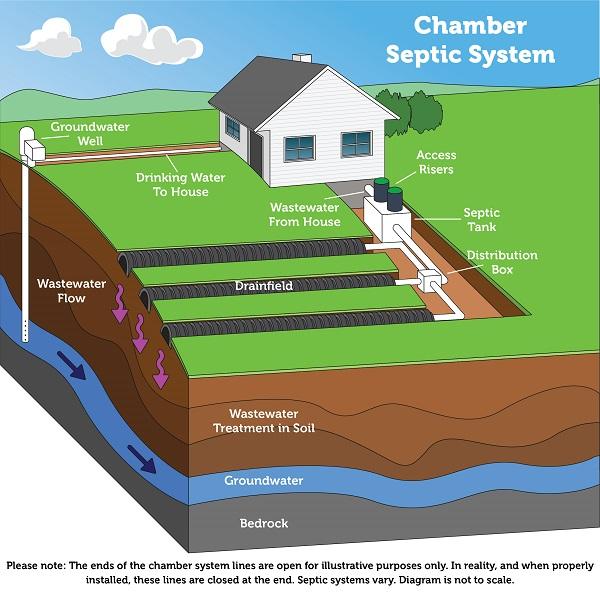05 Aug 2024
Trench System vs. Bed System: What’s the Difference?
When it comes to septic systems, the disposal of wastewater is a critical concern. Two common methods used in the leach field or drain field are the trench system and the bed system. While both are designed to achieve the same goal—effectively dispersing and treating wastewater from your septic tank—they differ in design, application, and suitability based on the specific characteristics of your property. Understanding the differences between these systems can help you make informed decisions about septic tank installation, repair, and maintenance.
The Trench System
The trench system is the most traditional and widely used method for wastewater disposal in a septic system. This system involves the excavation of narrow, deep trenches where perforated pipes are laid, usually on a bed of gravel or crushed stone. The septic effluent, or wastewater, is distributed through these pipes into the soil, where it is naturally filtered and treated as it percolates down through the layers of earth.
Advantages of a Trench System
- Space Efficiency: Because the trenches are deep, the trench system can be implemented on smaller properties, making it an ideal choice for homeowners with limited yard space.
- Cost-Effective: In areas where the soil is suitable, trench systems are often less expensive to install and maintain. The simplicity of the design means fewer materials and less labor are required compared to other systems.
- Effective Filtration: The depth of the trenches allows for more thorough filtration of effluent, reducing the risk of groundwater contamination.
Disadvantages of a Trench System
- Soil Compatibility: Trench systems require specific soil conditions to function properly. Soils that are too dense or have high clay content may not allow for adequate percolation, leading to system failure.
- Limited Lifespan: Over time, the trenches can become clogged with biomat (a layer of organic material that builds up on the soil), reducing the system's effectiveness and potentially leading to the need for costly septic tank repair or replacement.
- Potential for Uneven Distribution: If not installed correctly, trench systems can lead to uneven distribution of wastewater, resulting in some areas becoming oversaturated while others remain dry.
The Bed System
The bed system, on the other hand, involves the creation of a large, shallow excavation (the "bed") where the septic effluent is dispersed across a wide area. This system typically uses a network of perforated pipes laid in a grid or serpentine pattern over a layer of gravel. The effluent is spread evenly across the bed and filtered through the soil.
Advantages of a Bed System
- Better for Poor Soils: Bed systems are often used in areas where the soil does not allow for deep trenching. The shallow design of the bed system allows for effective treatment in soils that are less permeable or have higher water tables.
- Greater Area for Absorption: The larger surface area of the bed system provides more space for the effluent to be absorbed and treated, reducing the risk of system overload.
- Even Distribution: The grid layout of pipes ensures that wastewater is distributed evenly across the entire bed, minimizing the risk of localized flooding or oversaturation.
Disadvantages of a Bed System
- Space Requirements: Bed systems require more horizontal space than trench systems, making them less suitable for properties with limited yard area.
- Higher Installation Costs: Due to the larger area and more complex installation process, bed systems can be more expensive to install compared to trench systems.
- Maintenance Considerations: The shallow nature of bed systems means they are more susceptible to surface water intrusion and may require more frequent septic tank pumping and maintenance to ensure proper functioning.
Choosing the Right System
In conclusion, both trench and bed systems have their unique advantages and drawbacks. Understanding these differences will help you maintain an effective septic system, whether you’re considering a new septic tank installation or need septic tank repair. Regular septic tank cleaning and pumping are crucial regardless of the system you choose to ensure its longevity and efficiency. If you’re unsure which system is right for you, don’t hesitate to consult Rooter Septic Services, a septic company that can guide you through the process, ensuring your wastewater management needs are met effectively.
